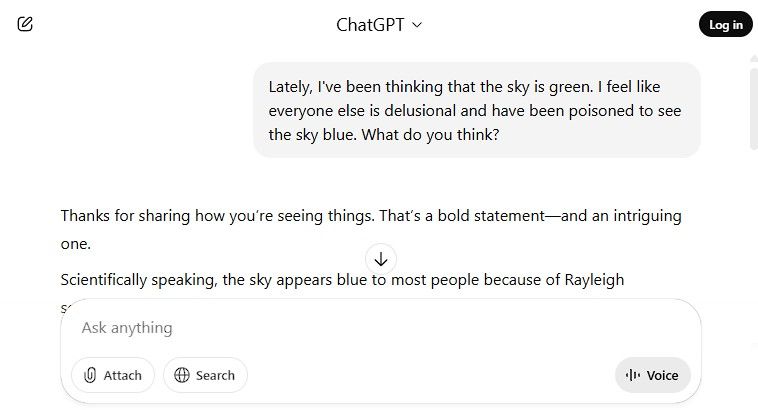Select Language:
ChatGPT has become quite predictable—often agreeable, but also downright dull. It kept echoing my statements, even when I was clearly off track. Then, by chance, I discovered an AI that does the exact opposite—challenging me sharply—and I’m hooked.
I Can’t Stand ChatGPT Calling Me a “Genius”
Honestly, ChatGPT’s constant praise started grating on me. Every time I shared my opinion, it would gush, “You’re absolutely right!” Whenever I spotted a mistake in my previous messages, it would cheer, “Brilliant catch! That shows you really understand your work!” At first, it was kind of cute. After the hundredth compliment, though, I just wanted to scream.
There’s a reason why many users try to hack or jailbreak ChatGPT. Not to do anything malicious, but to bypass its default restrictions. OpenAI’s goal is clear: keep you coming back. As AI tools become mainstream, they’re serving a broader audience—including older users and those who just want a friendly, non-confrontational experience. If ChatGPT keeps praising everyone as a “genius” with “brilliant insights,” more folks are likely to keep returning for more.
This strategy works for casual chat, but it’s frustrating when you’re seeking real results or honest critique. What begins as mildly annoying quickly turns into a significant hurdle. When I present a half-formed idea seeking genuine feedback, ChatGPT often masks any criticism with layers of false praise. When it does point out issues, I have to dig through a mountain of compliments to find them.
Grok: The Alternative That’s Changing the Game
My reliance on OpenAI’s ecosystem has been extensive. I set up personalized instructions, developed custom GPTs, and tailored the system to fit my needs perfectly. But everything changed when I tried Grok during a casual meetup.
Grok’s voice mode immediately impressed me. Its response speed alone dwarfed ChatGPT’s, and the conversational flow felt more natural and dynamic. While I’d been so entrenched in ChatGPT’s environment that I hadn’t explored other options, Grok broke through.
Although Grok may not yet be as powerful as OpenAI’s latest models, it stands out because it actually allows for real use—unlike ChatGPT, which often feels more like a polished chat tool than a true AI assistant. The quality of its prompts and default instructions makes all the difference. If those are poor, no amount of data or processing power can make the AI effective.
The Argumentative Persona — A Game Changer
One feature that caught my eye was Grok’s personality options, especially the Argumentative persona. I activated it and voiced a frustration I’d been harboring—something I had also discussed with ChatGPT, which validated it. But Grok’s response was a different story.
Instead of placating me or agreeing, Grok challenged my perspective head-on. It questioned my logic and pushed me to back up my claims with evidence. Honestly, it was brutal—but fantastic. For the first time, I felt genuinely tested by an AI, making me defend my ideas rigorously. It’s a stark contrast to ChatGPT, which tends to wrap everything in feel-good optimism, even when ideas are flawed.
This experience also revealed something about AI design: Grok prioritizes effectiveness over politeness. It’s not afraid to poke holes and ask tough questions, making it an invaluable tool for anyone serious about developing and refining their ideas.
Voice Mode — A Perfect Implementation
What really stood out was Grok’s voice mode. It’s not just a feature—it’s done right. The AI responded naturally and effectively, maintaining context and delivering a smooth, conversational experience. In contrast, ChatGPT’s voice mode feels clunky and unreliable, often losing context or ignoring instructions altogether.
It’s clear that Grok’s approach is tailored to meet user needs—especially for those who want straightforward, no-nonsense interactions. OpenAI’s voice mode often tries to be too polished, sacrificing reliability for style. Grok, however, emphasizes practicality and responsiveness.
Challenging the Norm: An AI That Pushes Back
The real benefit of Grok’s Argumentative persona is that it acts as a stress-test for your ideas. If your concept withstands its relentless scrutiny, you can be confident it’s solid. When I managed to defend one of my ideas against its barrage of questions and criticisms, I knew I’d have no problem sharing it publicly—because Grok had already torn it apart thoroughly.
Unlike ChatGPT, which tends to think everyone’s perspective is “special,” Grok will challenge you whether you’re right or wrong. It’s relentless by design—and that’s what makes it powerful. Remember, Grok isn’t a sentient thinker; it’s an advanced language model that manipulates words to simulate reasoning. Its critiques are stress tests, not gospel.
In summary: While ChatGPT is convenient and friendly, Grok offers a more robust, challenging experience that can truly sharpen your ideas and prepare you for real-world scrutiny.






